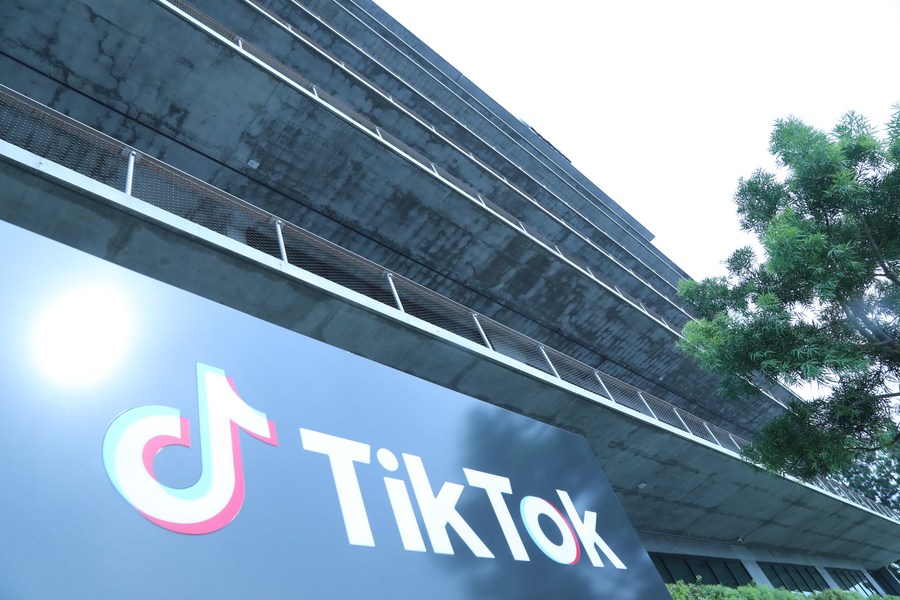
Photo taken on Aug. 25, 2020 shows screens displaying U.S. Secretary of State Mike Pompeo giving a speech to the Republican National Convention (RNC) from Jerusalem. (Xinhua/Liu Jie)
"Clean" in a dirty way.
By abusing the state power against Chinese tech companies, Washington is again resorting to its old trick of outright slandering and political manipulation.
BEIJING, Aug. 29 (Xinhua) -- When U.S. Secretary of State Mike Pompeo whizzed around the world to propagandize Washington's Clean Network program, his dirty motive to perpetuate U.S. tech hegemony could not be more obvious.
By attempting to purge Chinese tech companies from American internet, the U.S. administration has also shown that it is ideology, rather than reason, that guides its policy-making.
The irony of Pompeo's frenzied peddling does not escape the world, as the international community, including U.S. traditional allies, has already come to the realization that the United States is really the top empire of hackers in the world.

Edward Snowden is seen on the display of a camera during a live remote interview at CeBIT 2015, the world's top trade fair for information and communication technology, in Hanover, Germany, on March 18, 2015. (Xinhua/Zhang Fan)
The exposure of U.S. cyber espionage activities from PRISM to Equation Group to ECHELON, as well as the revelation that U.S. spy agencies run a 24/7 surveillance of cellphones and computers worldwide and have even eavesdropped on leaders of U.S. allies for years, have all pointed to nothing but modus operandi of a hacker state.
For the past few years, Washington's propaganda machine has been ruthlessly churning out slanders against Chinese tech companies, with the U.S. government blatantly stretching concept of national security and abusing its state power to seek to bring down certain outperforming Chinese enterprises.
The leading Chinese 5G equipment provider Huawei bears the brunt of Washington's fanatic witch-hunt. However, over the past 30 years, there has never been a single cybersecurity incident involving Huawei products like those revealed by Edward Snowden or WikiLeaks, nor a single tapping or surveillance operation like PRISM, Equation Group or ECHELON. And not a single country has produced evidence of any backdoors in Huawei products.
The White House has recently again resorted to the flimsy fig leaf of national security and issued an executive order banning any U.S. transactions with ByteDance, parent company of video-sharing social networking company TikTok.

Photo taken on Aug. 21, 2020 shows the video-sharing social networking company TikTok's Los Angeles Office in Culver City, Los Angeles County, the United States. (Xinhua)
However, according to The New York Times, even its spy agency has assessed that there is no evidence that China has intercepted TikTok's data, or used the app to intrude on users' mobile phones.
By abusing the state power against Chinese tech companies, Washington is again resorting to its old trick of outright slandering and political manipulation.
For China hardliners in Washington, who are no less than prisoners of the Cold War mindset and the zero-sum mentality, any technological advances achieved by Chinese tech companies are genuine threats in their eyes to America's global technological hegemony.
In fact, it is nothing new for Washington to use its state machine to suppress foreign tech companies by means of coercion and intimidation, preying on a list of global industry leaders including Toshiba and Alstom.
With the agenda of maintaining U.S. tech hegemony on mind, some U.S. politicians have openly discarded the principles of market economy and fair competition, which they have always flaunted.

A man walks past a poster during the RSA cyber security conference in San Francisco, the United States, on April 17, 2018. (Xinhua/Wu Xiaoling)
As the world is still grappling with the ravaging COVID-19 pandemic and its economic tolls, technological development is expected to play a crucial role in ensuring economic recovery across the globe.
China and the United States have their respective strengths in the digital and technological field, and a constructive cooperation between the two largest economies will certainly constitute a driving force for the recovery of world economy in the post-pandemic era.
The artificial division of the Internet ecological chain, as sought by Washington's Clean Network program, will not only cause systemic damage to the economic interests of both sides, but also disrupt the global information and communication industry chain and supply chain, putting prospect of global economic recovery at risk.
All countries are obliged to provide a fair, just and non-discriminatory business environment for foreign companies that invest, operate and have cooperation on their soil. Washington should think twice before going further down a blind alley. ■



